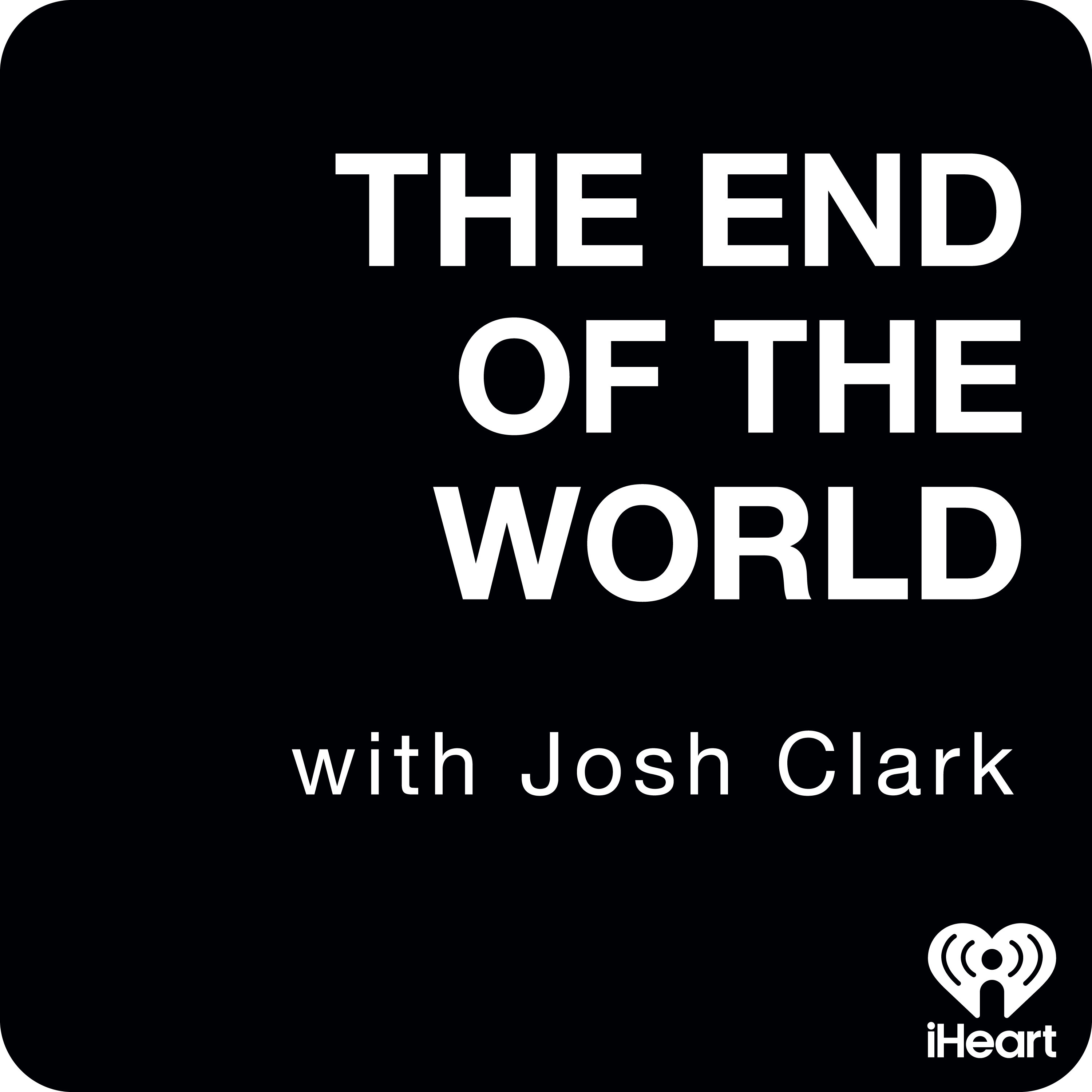Discover The End Of The World with Josh Clark
The End Of The World with Josh Clark

The End Of The World with Josh Clark
Author: iHeartPodcasts
Subscribed: 23,158Played: 350,515Subscribe
Share
2026 iHeartMedia, Inc. © Any use of this intellectual property for text and data mining or computational analysis including as training material for artificial intelligence systems is strictly prohibited without express written consent from iHeartMedia
Description
We humans could have a bright future ahead of us that lasts billions of years. But we have to survive the next 200 years first. Join Josh Clark of Stuff You Should Know for a 10-episode deep dive that explores the future of humanity and finds dangers we have never encountered before lurking just ahead. And if we humans are alone in the universe, if we don't survive intelligent life dies out with us too.
12 Episodes
Reverse
We humans could have a bright future ahead of us that lasts billions of years. But we have to survive the next 200 years first. Learn more about your ad-choices at https://www.iheartpodcastnetwork.comSee omnystudio.com/listener for privacy information.
Why are smart people warning us about artificial intelligence? As machines grow smarter and able to improve themselves, we run the risk of them developing beyond our control. But AI is just one of the existential risks emerging in our future. Learn more about your ad-choices at https://www.iheartpodcastnetwork.comSee omnystudio.com/listener for privacy information.
Ever wondered where all the aliens are? It’s actually very weird that, as big and old as the universe is, we seem to be the only intelligent life. In this episode, Josh examines the Fermi paradox, and what it says about humanity’s place in the universe. (Original score by Point Lobo.) Interviewees: Anders Sandberg, Oxford University philosopher and co-creator of the Aestivation hypothesis; Seth Shostak, director of SETI; Toby Ord, Oxford University philosopher. Learn more about your ad-choices at https://www.iheartpodcastnetwork.comSee omnystudio.com/listener for privacy information.
The Great Filter hypothesis says we’re alone in the universe because the process of evolution contains some filter that prevents life from spreading into the universe. Have we passed it or is it in our future? Humanity’s survival may depend on the answer. (Original score by Point Lobo.) Interviewees: Robin Hanson, George Mason University economist (creator of the Great Filter hypothesis); Toby Ord, Oxford University philosopher; Donald Brownlee, University of Washington astrobiologist (co-creator of the Rare Earth hypothesis); Phoebe Cohen, Williams College paleontologist. Learn more about your ad-choices at https://www.iheartpodcastnetwork.comSee omnystudio.com/listener for privacy information.
Humanity could have a future billions of years long – or we might not make it past the next century. If we have a trip through the Great Filter ahead of us, then we appear to be entering it now. It looks like existential risks will be our filter. (Original score by Point Lobo.) Interviewees: Nick Bostrom, Oxford University philosopher and founder of the Future of Humanity Institute; David Pearce, philosopher and co-founder of the World Transhumanist Association (Humanity+); Robin Hanson, George Mason University economist (creator of the Great Filter hypothesis); Toby Ord, Oxford University philosopher; Sebastian Farquahar, Oxford University philosopher. Learn more about your ad-choices at https://www.iheartpodcastnetwork.comSee omnystudio.com/listener for privacy information.
Humans have faced existential risks since our species was born. Because we are Earthbound, what happens to Earth happens to us. Josh points out that there’s a lot that can happen to Earth - like gamma ray bursts, supernovae, and runaway greenhouse effect. (Original score by Point Lobo.) Interviewees: Robin Hanson, George Mason University economist (creator of the Great Filter hypothesis); Ian O’Neill, astrophysicist and science writer; Toby Ord, Oxford University philosopher. Learn more about your ad-choices at https://www.iheartpodcastnetwork.comSee omnystudio.com/listener for privacy information.
An artificial intelligence capable of improving itself runs the risk of growing intelligent beyond any human capacity and outside of our control. Josh explains why a superintelligent AI that we haven’t planned for would be extremely bad for humankind. (Original score by Point Lobo.) Interviewees: Nick Bostrom, Oxford University philosopher and founder of the Future of Humanity Institute; David Pearce, philosopher and co-founder of the World Transhumanist Association (Humanity+); Sebastian Farquahar, Oxford University philosopher. Learn more about your ad-choices at https://www.iheartpodcastnetwork.comSee omnystudio.com/listener for privacy information.
Natural viruses and bacteria can be deadly enough; the 1918 Spanish Flu killed 50 million people in four months. But risky new research, carried out in an unknown number of labs around the world, are creating even more dangerous humanmade pathogens. (Original score by Point Lobo.) Interviewees: Beth Willis, former chair, Containment Laboratory Community Advisory Committee; Dr Lynn Klotz, senior fellow at the Center for Arms Control and Non-Proliferation. Learn more about your ad-choices at https://www.iheartpodcastnetwork.comSee omnystudio.com/listener for privacy information.
Surprisingly the field of particle physics poses a handful of existential threats, not just for us humans, but for everything alive on Earth – and in some cases, the entire universe. Poking around on the frontier of scientific understanding has its risks. (Original score by Point Lobo.) Interviewees: Don Lincoln, Fermi National Laboratory senior experimental particle physicist; Ben Shlaer, University of Auckland cosmologist University of Auckland; Daniel Whiteson, University of California, Irvine astrophysicist; Eric Johnson, University of Oklahoma professor of law Learn more about your ad-choices at https://www.iheartpodcastnetwork.comSee omnystudio.com/listener for privacy information.
We humans are our own worst enemies when it comes to what it will take to deal with existential risks. We are loaded with cognitive biases, can’t coordinate on a global scale, and see future generations as freeloaders. Seriously, are we going to survive? (Original score by Point Lobo.)Interviewees: Nick Bostrom, Oxford University philosopher and founder of the Future of Humanity Institute; Toby Ord, Oxford University philosopher; Anders Sandberg, Oxford University philosopher; Sebastian Farquahar, Oxford University philosopher; Eric Johnson, University of Oklahoma professor of law Learn more about your ad-choices at https://www.iheartpodcastnetwork.comSee omnystudio.com/listener for privacy information.
Josh explains that to survive the next century or two – to navigate our existential threats – all of us will have to become informed and involved. It will take a movement that gets behind science done right to make it through the Great Filter. (Original score by Point Lobo.) Interviewees: Toby Ord, Oxford University philosopher; Sebastian Farquahar, Oxford University philosopher Learn more about your ad-choices at https://www.iheartpodcastnetwork.comSee omnystudio.com/listener for privacy information.
There’s one last thing. Maybe the reason why we don’t see other intelligent life, maybe the reason we are in the astoundingly unique position of having to save the future of the human race, is because we are simulated human beings. It would explain a lot. (Original score by Point Lobo.)Interviewees: Nick Bostrom, Oxford University philosopher and founder of the Future of Humanity Institute; Anders Sandberg, Oxford University philosopher; Seth Shostak, director of SETI Learn more about your ad-choices at https://www.iheartpodcastnetwork.comSee omnystudio.com/listener for privacy information.


















fascinating
intriguing
Cold, SARS, MERS, COVID, .............
Thank you, "stuff you should be really scared" a Markus, FIN
37:26
Thank you for the fascinating podcast.
Relistening to this during the covid19 pandemic is bone chilling.
you speak like Skully
its interesting to me how growth is simply assumed. what is there are aliens but they simply dont consume like we do. they maintain their world, population, and resources.
shouldn't have cussed in my first comment. I'll reiterate, this is the best podcast I have ever heard! thank you so much for making this! I'm going to share the crap out of this
holy shit man, that was the best fuckin podcast I have ever heard! thank you! i didn't know i was Looking for this tool I found it, please dont stop making broadcasts like this. it was absolutely amazing. imma share the shit out of it!!
alrighty! I started listening to this after I heard about it on StarTalk. Loving it so far, I started asking myself questions regarding the Fermi Paradox episode. There's a number of holes in this theory which a big ones (in my opinion). Firstly, why has no other civilization come to us? why have we not been taken into the Bossom of Civilizations that must be teaming in the universe given the amount of worlds there are? A clear answer presents itself here. They have not hear or seen us. our Radio signals have only traveled 110 lyrs. Which yes, encompasses a lot of star systems maybe a 100000! However our galaxy is 100000 lyrs across and has 200 billion or so star systems. that's a lot of star systems our signals have not yet reached. secondly, we haven't seen any evidence of civilizations when looking out! why? surely we would have seen something by now.... Not necessarily. when we look out we see things as they were. Not as they are. so we look at star systems 1000 lyrs away, that's
I knew I would hear Daniel Whiteson's voice, cause I listen to his podcast and it is in the iHeartRadio network.
I believe there is an editing error somewhere in the middle. One part is repeated twice.
the music in the background at 16:20 sounds like the music in the youtube video, "Betting on Infinity," a refutation to Pascal's Wager.
fascinating listen. thoroughly enjoyed these.
4
It is absolutely possible that we all live inside my butt. Every conceivable objection to this thesis betrays either a lack of imagination or an unnecessary time constraint. There is no reason not to assume that our ancestors at one point in time are able to recreate my butt from traces of my until then hopelessly destroyed DNA and proceed to create a small universe inside my recreated butt in which we are living now. Indeed, I maintain that it is not only possible, but, given enough time and imagination, an absolute necessity.
Great podcast!!! Need more
This would make a great educational video for high schoolers or even a short television series to get the thought in more people's minds